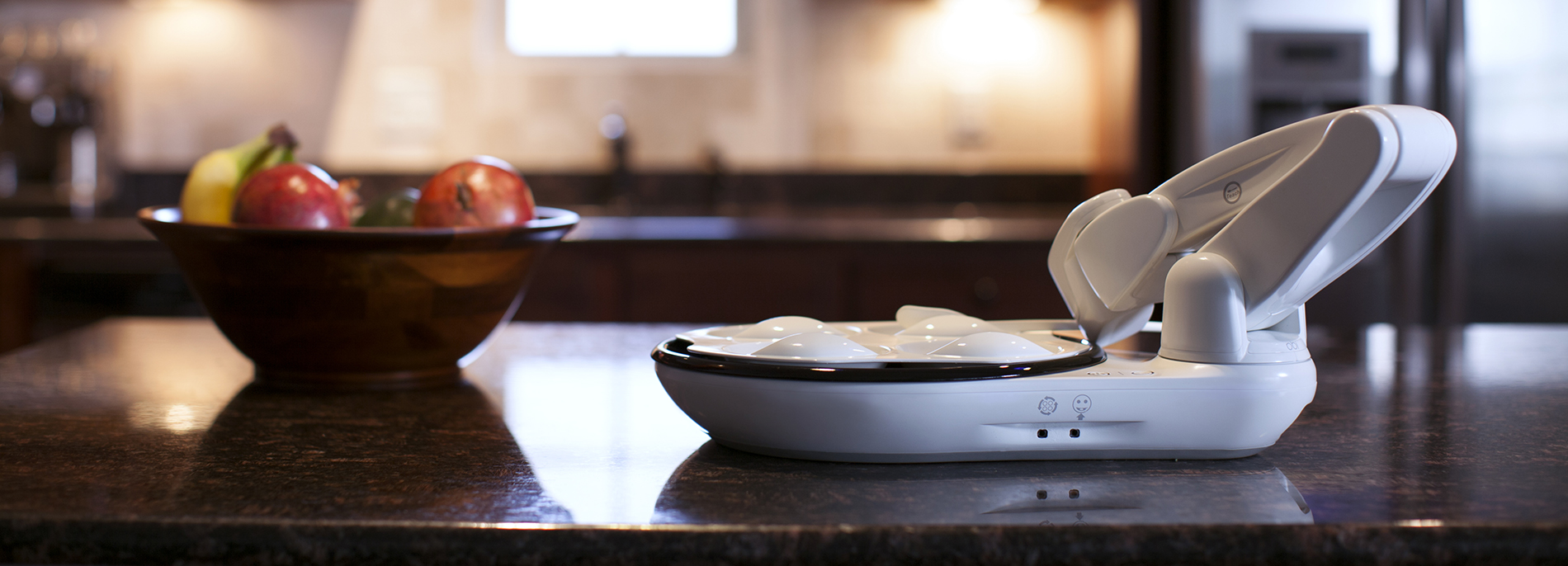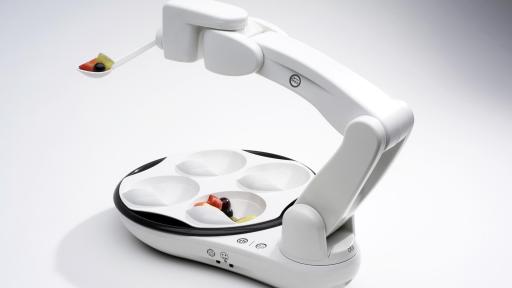New Obi™ Robotic Dining Device a Breakthrough for People Living with Physical Challenges
Spouses, parents and others also enjoy the charming robot
PR Newswire, BLOOMFIELD HILLS, MICH.—July 12, 2016
The simple act of eating a meal will become more dignified and enjoyable for many people with physical challenges with the launch of Obi™, a revolutionary robotic dining device. Obi blends cutting-edge robotics, elegant design, intuitive controls and a friendly personality to give individuals who are fed by others the ability to take control of their meals at home and in public.
“We believe dining is one of life’s greatest pleasures that absolutely everyone should enjoy,” said Jon Dekar, DESῙN’s co-founder. “What our device stands for is equally as important as what it does. It represents our belief that living with physical challenges can be fulfilling and inspiring. Technology, and specifically robotics, combined with modern design, should facilitate that.”
Obi is a revolutionary dining companion for those with physical challenges. Join the dining revolution! Tweet
Obi is the first product from DESῙN, a small team of visionaries from Michigan and Ohio. The first Obi prototype was developed in 2006 by Jon Dekar, a University of Dayton engineering student who saw the challenges faced by people with disabilities as varied as his aging grandfather and a 6-year-old girl with Arthrogryposis.
“Every day, millions of people must be fed by caregivers, and they find the experience to be conspicuous and frustrating. Feeding oneself is a basic human need, and there was no good solution available. I became inspired to change that,” said Jon Dekar.
Jon and his father Tom, a retired vice chairman of Deloitte and community leader, founded DESῙN in 2010. They spent the next six years refining Obi’s design, securing investors, sourcing suppliers, testing prototypes with a diverse group of users and building relationships with key community stakeholders.
“This has been an incredible nine-year journey to go from my dorm room prototype to having Obi units manufactured and ready to sell,” said Jon Dekar. “Today is a milestone for our team, but it’s far more important in terms of what Obi brings to people living with physical limitations. During this journey, I’ve met so many amazing people who face incredible challenges with grace and strength. It’s an honor and privilege to be able to help them reclaim something as fundamental as eating a meal together with friends and family.”
Obi leads a new generation of devices that take advantage of emerging small-scale and sophisticated, yet relatively inexpensive robotic technology to deliver a meaningful lifestyle benefit to consumers.
“To date, consumer robots have generally been toys. People have been entertained by plenty of dancing robots and they are now looking for technology that will help them in their daily lives,” said Jon Dekar. “We saw an opportunity to do just that with Obi. We have truly advanced the state of the art to create a practical solution that also offers the stylish design detail that today’s consumers expect from a modern device.”
When people first use Obi, they feel astonished and then elated as they realize how the robot will change their lives for the better. Diners are empowered by the independence it provides; how easy it is to use; its elegance and beauty; and its ability to restore the social interaction of dining with others. Typically, in a public setting, individuals feel being fed by others highlights their physical challenges. With Obi, that attention is both alleviated and diverted towards Obi’s iconic design.
“It’s just not an enjoyable experience to have someone feed you, either for the person who’s eating or the person doing the feeding,” said David Hare, a year-long Obi diner living with Amyotrophic Lateral Sclerosis (ALS). “I can’t describe how much more fun meals are now, both for me and my wife, who has long helped me eat. I know people are passionate about their cell phones and laptops, but it’s nothing compared to the excitement I feel about my Obi. Getting it was literally a life-changing experience.”
Countless others feel the same.
“Obi has benefited the whole family,” explained Amanda Golembiewski, mother of Grace, a 3-year-old living with Arthrogryposis. “The time I used to spend feeding Grace can now be spent taking care of all three of my kids!”
Obi’s key functionality is a robotic arm that selects virtually any properly sized food from one of four compartments. Obi then delivers the food to one of several thousand potential locations where the diner can eat from the spoon. That means Obi can accommodate nearly any age demographic and diner preferred position or orientation.
With Obi, diners have complete control over what they eat, and when they eat it – some for the first time in their entire life. “Finally, I can skip over my vegetables!” proclaimed Isaac Wilcox to his parents, a 15-year-old Obi diner living with a C4 spinal cord injury.
Supplied by a rechargeable battery, Obi holds enough energy to serve four to six meals on a single charge. Obi also fits within the confines of a dinner placemat, operates quietly and can be carried with ease like a laptop computer. The product has been awarded eight patents to date, covering a variety of innovations and capabilities. Obi is also a finalist in the 2016 International Design Excellence Awards. Designed and manufactured in the United States, Obi is FDA compliant and is certified by Underwriters Laboratories.
The name “Obi” is derived from the word “obeisance” which is a term for a gesture of respect or deference, such as a bow or curtsy. In recognition of this, the Obi device fluidly “bows” to its user when turned on.
An Obi device is available for purchase in the United States through DESῙN’s website at www.meetobi.com.
# # #
About DESῙN
Our purpose is to continually improve the quality of life by delivering robotic product solutions that empower and excite individuals like never before.
DESῙN (pronounced “design”) was founded in 2010 by the father and son team of Tom and Jon Dekar and is headquartered in Bloomfield Hills, Mich. with operations in Michigan and Ohio. DESῙN is privately-held and is funded by a mix of individual and institutional investors. Its first product, the Obi™ assistive dining device, was launched in 2016. For more information, visit www.meetobi.com.
Contact:
Dan Artman, APR, (313) 505-1961, [email protected]
Mary Parkinson, (313) 567-5094, [email protected]
Pat Adanti-Joy, APR, (313) 567-5046, [email protected]






